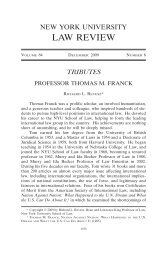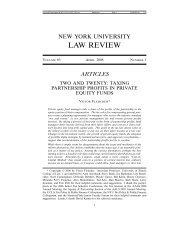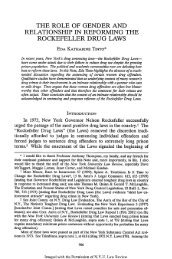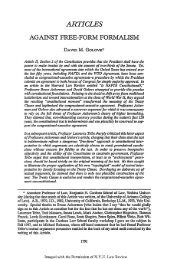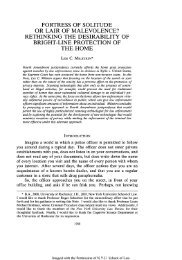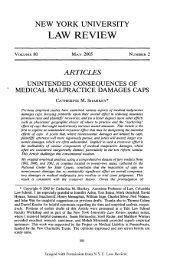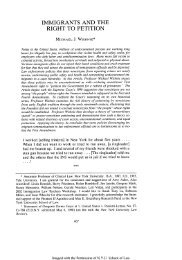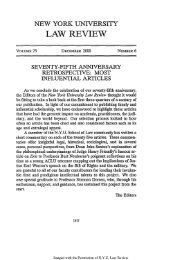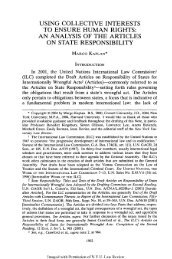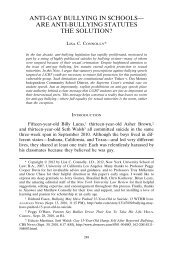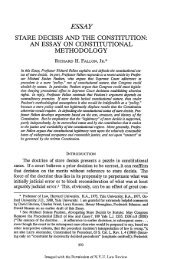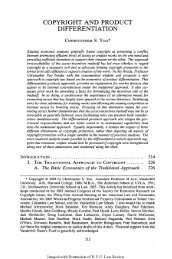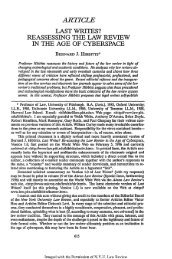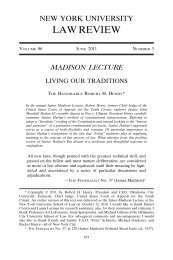Administrative Law and the Legacy of Henry J ... - NYU Law Review
Administrative Law and the Legacy of Henry J ... - NYU Law Review
Administrative Law and the Legacy of Henry J ... - NYU Law Review
You also want an ePaper? Increase the reach of your titles
YUMPU automatically turns print PDFs into web optimized ePapers that Google loves.
Imaged with <strong>the</strong> Permission <strong>of</strong> N.Y.U. <strong>Law</strong> <strong>Review</strong>NEW YORK UNIVERSITYLAW REVIEWVOLUME 74 APRIL 1999 NumBER 1ADMINISTRATIVE LAW AND THELEGACY OF HENRY J. FRIENDLYA. RAYMOND RAND OLPH*Winston Churchill once told a friend, "I never say, 'It gives megreat pleasure,' to speak to any audience because <strong>the</strong>re are only a fewactivities from which I derive intense pleasure <strong>and</strong> speaking is not one<strong>of</strong> <strong>the</strong>m."I do not share Churchill's sentiments today. I gladly confess-itdoes indeed give me great pleasure to speak to you about Judge<strong>Henry</strong> J. Friendly <strong>and</strong> administrative law. Judge Friendly remains myjudicial hero. When Ed Huddleson suggested this topic, I couldhardly resist. The subject he proposed is fitting. For I know personallythat Judge Friendly was very much an admirer <strong>of</strong> JudgeLeventhal's work on <strong>the</strong> D.C. Circuit.Since I have been on <strong>the</strong> court, thoughts <strong>of</strong> <strong>Henry</strong> Friendly havenever been far from my mind. His photograph looks back at me whenI am working in chambers. Scarcely a week goes by when I do notcome across something he has written, some reference to his vaitings,on <strong>the</strong> bench <strong>and</strong> <strong>of</strong>f. He has been gone now for more than a decade.Yet <strong>the</strong> Supreme Court <strong>and</strong> <strong>the</strong> lower federal courts still frequentlycite his opinions, adding a paren<strong>the</strong>tical to signal his authorship. Andhis books, speeches, <strong>and</strong> scholarly articles continue to exert a powerfulinfluence <strong>and</strong> to impress.A few days ago I was catching up on United States <strong>Law</strong> Week.There, in a habeas corpus case decided this May, I noticed <strong>the</strong>* Circuit Judge, United States Court <strong>of</strong> Appeals for <strong>the</strong> District <strong>of</strong> Columbia Circuit.B.S., 1966, Drexel University;, J.D., 1969, University <strong>of</strong> Pennsylvania. This is <strong>the</strong> revisedtext <strong>of</strong> an address before <strong>the</strong> District <strong>of</strong> Columbia Bar at its Harold Leventhal LectureSeries, held in Washington, D.C., on June 23, 1998.1
Imaged with <strong>the</strong> Permission <strong>of</strong> N.Y.U. <strong>Law</strong> <strong>Review</strong>April 1999]LEGACY OF HENRY J. FRIENDLYgreat firm [Cleary, Gottlieb, Friendly & Cox 3 ] <strong>and</strong> did two fulltimejobs-doubling as general counsel <strong>of</strong> Pan American WorldAirways. 4Although while practicing law <strong>Henry</strong> Friendly doubtless "gave littleattention to <strong>the</strong> judicial process, <strong>the</strong> relationship <strong>of</strong> state law t<strong>of</strong>ederal judicial power or <strong>the</strong> problems <strong>of</strong> institutional neglect <strong>of</strong> <strong>the</strong>sources <strong>of</strong> American law," his ascension to <strong>the</strong> bench in 1959 at agefifty-six "touched <strong>of</strong>f a volcanic eruption <strong>of</strong> pr<strong>of</strong>ound scholarly writing."5 In <strong>the</strong> space <strong>of</strong> just five years, "from 1960-1965, he produced n<strong>of</strong>ewer than fourteen deeply reflective, scholarly articles on those <strong>and</strong>many o<strong>the</strong>r subjects." 6 Through <strong>the</strong>se works <strong>and</strong> his many later writings,<strong>and</strong> through hundreds <strong>of</strong> judicial opinions, Judge Friendly "builtone <strong>of</strong> <strong>the</strong> great masterpieces <strong>of</strong> American jurisprudence." 7 I shareJudge Leval's confidence that "when <strong>the</strong> history <strong>of</strong> <strong>the</strong> entire centurycomes to be written, <strong>Henry</strong> Friendly will join" Holmes, Br<strong>and</strong>eis,Cardozo, <strong>and</strong> Learned H<strong>and</strong> as <strong>the</strong> towering judges <strong>of</strong> <strong>the</strong> age. 8What made Judge Friendly such an extraordinary judge? Therewas first, <strong>of</strong> course, his genius. Over <strong>the</strong> years, I have encounteredextremely bright people. But none could hold a c<strong>and</strong>le to <strong>Henry</strong>Friendly. As my friend, Judge Michael Boudin <strong>of</strong> <strong>the</strong> First Circuitano<strong>the</strong>rformer Friendly clerk-is fond <strong>of</strong> saying, after a year <strong>of</strong> clerkingfor <strong>the</strong> judge, it was impossible to be intellectually intimidated byanyone. Judge Friendly combined his brilliance with unfailing modesty<strong>and</strong> grace, <strong>and</strong> with drive <strong>and</strong> speed-blazing speed. To useWilliam James's phrase, he always "energized" at his "maximum." 9During my year <strong>of</strong> clerking I never saw <strong>the</strong> judge spend more than aday writing an opinion (<strong>and</strong> write <strong>the</strong>m all he did).Yet even <strong>the</strong>se extraordinary qualities do not necessarily make agreat judge. Something more is needed-wisdom. "And what is wisdom[?],"Learned H<strong>and</strong> once asked in his essay on Cardozo. 10 H<strong>and</strong>answered his question: "I do not know; like you, I know it when I seeit, but I cannot tell <strong>of</strong> what it is composed. One ingredient I think I do3 See Lyman M. Tondel, Jr., <strong>Henry</strong> J. Friendly. Practicing <strong>Law</strong>yer 1928-1959, 1978Ann. Surv. Am. L. xxv, xxvi (describing Friendly's role in founding firm).4 Pierre N. Leval, <strong>Henry</strong> J. Friendly: In Memory <strong>of</strong> a Great Man, 52 Brook. L Rev.571, 571 (1986).5 Id. at 572.6 Id.7 Id. at 571.8 Id. at 571-72.9 William James, The Energies <strong>of</strong> Men (1907), reprinted in Memories <strong>and</strong> Studies, 229,233 (Greenwood Press 1968) (1911).10 Learned H<strong>and</strong>, Mr. Justice Cardozo, 48 Yale LJ. 379, 380 (1939).
CRIMINAL INVESTIGATIONS DIVISIONThe Criminal Investigation Division provides trained investigators who h<strong>and</strong>le all criminalinvestigations & interrogations <strong>and</strong> process crime scenes. CID also encompasses <strong>the</strong> Domestic AbuseUnit, Internal Affairs <strong>and</strong> School Resource Officers.Criminal InvestigationDivision Stats - 2004TotalsTotalsMonth Cases Worked Indictments from CasesJanuary 37February 32 34/48March 41April 52 31/34May 45June 53 57/69July 30August 34 47/65September 45October 37 39/61November 41December 45 71/95INTERNAL AFFAIRS / PUBLIC INFORMATIONInternal Affairs Cases Worked 4Work Injury Reports 19Community Events Attended 23Neighborhood Watch MeetingsConducted8Press Releases to Media 83
Imaged with <strong>the</strong> Permission <strong>of</strong> N.Y.U. <strong>Law</strong> <strong>Review</strong>April 1999]LEGACY OF HENRY J. FRIENDLYintra-agency appeals are only one aspect <strong>of</strong> <strong>the</strong> exhaustion doctrine.Ano<strong>the</strong>r aspect, not governed by <strong>the</strong> APA but sometimes by <strong>the</strong>agency's organic statute, is that a court will not consider claims <strong>the</strong>party failed to raise before <strong>the</strong> agency. If <strong>the</strong> agency's statute is silentabout this matter, <strong>the</strong> common law <strong>of</strong> exhaustion fills <strong>the</strong> gap. That is<strong>the</strong> point <strong>of</strong> <strong>the</strong> McGee decision. 31I should not leave you with <strong>the</strong> impression that <strong>the</strong> Second Circuitback <strong>the</strong>n was a hotbed for administrative law. It most certainlywas not. Apart from McGee <strong>and</strong> a few o<strong>the</strong>r Selective Service cases,my year <strong>of</strong> clerking saw a couple NLRB cases <strong>and</strong> one Civil AeronauticsBoard case, which Judge Friendly dispatched in a per curiam opinionwritten in about five minutes. My colleague Judge MerrickGarl<strong>and</strong>, who clerked for Judge Friendly from 1977 to 1978, can recallworking on only one significant administrative law case during his tenure.If your taste ran to that branch <strong>of</strong> federal jurisprudence, <strong>the</strong> D.C.Circuit was <strong>the</strong>n <strong>and</strong> still is <strong>the</strong> place to be. For that reason, JudgeFriendly always viewed our court with some envy. Throughout myyear <strong>of</strong> clerking he frequently complained that <strong>the</strong> D.C. Circuit got all<strong>the</strong> good cases. And in one speech he described <strong>the</strong> D.C. Circuit asa court <strong>of</strong> special importance for administrative law because, in additionto its exclusive jurisdiction over FCC licensing decisions <strong>and</strong>actions <strong>of</strong> <strong>the</strong> Environmental Protection Agency as to emissionst<strong>and</strong>ards under <strong>the</strong> Clean Air Act, it is an optional venue under aflock <strong>of</strong> regulatory statutes <strong>and</strong> has attracted-doubtless to <strong>the</strong> delight<strong>of</strong> <strong>the</strong> o<strong>the</strong>r circuits-<strong>the</strong> largest share <strong>of</strong> environmental litigation<strong>and</strong> review <strong>of</strong> orders <strong>of</strong> <strong>the</strong> Federal Power Commission fixingnatural gas rates. 32And, he added, <strong>the</strong> D.C. Circuit had "savored its role.1 33There is a touch <strong>of</strong> irony in <strong>the</strong>se remarks. The judge was quitehappy that <strong>the</strong> D.C. Circuit had-<strong>and</strong> to this day still has-exclusivejurisdiction over <strong>the</strong> review <strong>of</strong> FCC licensing decisions. JudgeFriendly would not have relished <strong>the</strong> caseload. When he wrote hisarticle, later a book, about <strong>the</strong> need for more definite administrativest<strong>and</strong>ards, he singled out comparative licensing as an area where rationalst<strong>and</strong>ards might be impossible <strong>and</strong> where it might <strong>the</strong>refore bepreferable to proceed by auction, with <strong>the</strong> radio or television license31 See McGee, 402 U.S. at 483 n.6 (rejecting claim that exhaustion doctrine "is inappropriatewhen fashioned by judicial decision ra<strong>the</strong>r than specific congressional comm<strong>and</strong>").32 <strong>Henry</strong> J. Friendly, "Some Kind <strong>of</strong> Hearing," 123 U. Pa. L Rev. 1267, 1310-11 (1975)(footnote omitted).33 Id. at 1311.
Imaged with <strong>the</strong> Permission <strong>of</strong> N.Y.U. <strong>Law</strong> <strong>Review</strong>NEW YORK UNIVERSITY LAW REVIEW[Vol, 74:1going to <strong>the</strong> highest bidder. 34 That was thirty-two years ago. Onlyrecently have we seen developments along <strong>the</strong>se lines. 35Despite <strong>the</strong> paucity <strong>of</strong> administrative law cases on <strong>the</strong> SecondCircuit's docket, Judge Friendly was able to make <strong>the</strong> most <strong>of</strong> whatcame before him. His opinion in National Nutritional Foods Ass'n v.FDA,36 for instance, still st<strong>and</strong>s as <strong>the</strong> leading case explaining <strong>the</strong> extentto which, after Citizens to Preserve Overton Park, Inc. v. Volpe, 37litigants may probe <strong>the</strong> mental processes <strong>of</strong> administrative decisionmakers.His opinion in Ellis v. Blum 38 remains a brilliant <strong>and</strong>thorough exposition on m<strong>and</strong>amus jurisdiction in <strong>the</strong> agency context.He wrote more than a thous<strong>and</strong> opinions, <strong>and</strong> many o<strong>the</strong>rs could bementioned. But one in particular st<strong>and</strong>s out because it has had such apr<strong>of</strong>ound <strong>and</strong> lasting impact, especially in <strong>the</strong> D.C. Circuit.In 1967, three Supreme Court cases, decided in t<strong>and</strong>em, revolutionizedjudicial review <strong>of</strong> agency rulemaking. I refer to Abbott Laboratoriesv. Gardner, 39 Toilet Goods Ass'n v. Gardner, 40 <strong>and</strong> Gardner v.Toilet Goods Ass'n. 41 The cases dealt with <strong>the</strong> <strong>the</strong>n novel question <strong>of</strong>when, if ever, <strong>the</strong>re could be pre-enforcement judicial review <strong>of</strong>agency regulations. "Before Abbott Laboratories <strong>the</strong> courts typicallyreviewed <strong>the</strong> lawfulness <strong>of</strong> an agency's rule, not when it was promulgated,but when it was enforced. After Abbott Laboratories reviewingpractice changed radically." '42The Supreme Court had granted certiorari in Abbott Laboratories,which came out <strong>of</strong> <strong>the</strong> Third Circuit, while Toilet Goods was stillpending in <strong>the</strong> Second Circuit. Judge Friendly wrote <strong>the</strong> opinion for34 See <strong>Henry</strong> J. Friendly, The Federal <strong>Administrative</strong> Agencies: The Need for BetterDefinition <strong>of</strong> St<strong>and</strong>ards 54-58, 71 (1962); see also Thomas W. Hazlett, Assigning PropertyRights to Radio Spectrum Users: Why Did FCC License Auctions Take 67 Years?, 41 J.L.& Econ. 529 (1998); R.H. Coase, Comment on Thomas W. Hazlett, 41 J.L. & Econ. 577(1998).35 See, e.g., Implementation <strong>of</strong> Section 3090) <strong>of</strong> <strong>the</strong> Communications Act-CompetitiveBidding for Commercial Broadcast <strong>and</strong> Instructional Television Fixed ServiceLicenses, FCC Docket No. 98-194, 13 Communications Reg. (P&F) 279 (Aug. 18, 1998)(first report <strong>and</strong> order) (setting forth procedures governing auctions <strong>of</strong> broadcast servicelicenses).36 491 F.2d 1141 (2d Cir. 1974).37 401 U.S. 402, 420 (1971) (holding that, while "inquiry into <strong>the</strong> mental processes <strong>of</strong>administrative decisionmakers is usually to be avoided," such inquiry may be required if itis "<strong>the</strong> only way <strong>the</strong>re can be effective judicial review").38 643 F.2d 68 (2d Cir. 1981).39 387 U.S. 136 (1967).40 387 U.S. 158 (1967).41 387 U.S. 167 (1967).42 Stephen G. Breyer & Richard B. Stewart, <strong>Administrative</strong> <strong>Law</strong> <strong>and</strong> Regulatory Policy1136 (2d ed. 1985).
April 1999]LEGACY OF HENRY J. FRIENDLYhis court. He devised a new test for reviewability in <strong>the</strong> followingterms:The question whe<strong>the</strong>r a plaintiff may obtain judicial relief incases like this has been variously phrased as whe<strong>the</strong>r he has "st<strong>and</strong>ing"to challenge <strong>the</strong> administrative action as a person "sufferinglegal wrong" or "aggrieved" within <strong>the</strong> meaning <strong>of</strong> § 10 <strong>of</strong> <strong>the</strong> APA,whe<strong>the</strong>r <strong>the</strong> dispute is an "actual controversy" within <strong>the</strong> DeclaratoryJudgment Act, or whe<strong>the</strong>r it is sufficiently "ripe" for resolutionby <strong>the</strong> courts. In fact, <strong>the</strong> critical issue is apt to be less a matter <strong>of</strong>st<strong>and</strong>ing or <strong>of</strong> actual controversy than <strong>of</strong> <strong>the</strong> advisability <strong>of</strong> reviewingan administrative rule prior to its application in a specific factualsituation. The current healthy trend toward implementing agencypolicy by rulemaking cuts both ways with respect to declaratory relief-increasing<strong>the</strong> need for this sort <strong>of</strong> assistance on <strong>the</strong> part <strong>of</strong>those subjected to such rules, but also creating a danger that, unless<strong>the</strong> courts are circumspect, administration may be improperlyhalted, at least temporarily, before it has gotten <strong>the</strong> slightest start.The problem is not to be solved, as <strong>the</strong> parties suggest, by applyingsome readily procurable litmus paper which will determine whe<strong>the</strong>ra controversy is "justiciable"; what is required, as in <strong>the</strong> case <strong>of</strong>challenge to <strong>the</strong> constitutionality <strong>of</strong> a statute, is a reasoned evaluation<strong>of</strong> "both <strong>the</strong> appropriateness <strong>of</strong> <strong>the</strong> issues for decision by courts<strong>and</strong> <strong>the</strong> hardship <strong>of</strong> denying judicial relief." '43To those conversant with <strong>the</strong> Supreme Court's Abbott Laboratoriesopinion, this language from Judge Friendly's opinion will soundvery familiar. The Supreme Court adopted it nearly word-for-wordmostlywithout attribution44-<strong>and</strong> it has become part <strong>of</strong> <strong>the</strong> fabric <strong>of</strong>administrative law ever since. It is noteworthy that Judge Friendly'sanalysis was not suggested by ei<strong>the</strong>r <strong>of</strong> <strong>the</strong> parties. Ano<strong>the</strong>r curiousfact is that although Judge Friendly quoted from Justice Frankfurter'sconcurrence in <strong>the</strong> blacklisting case Joint Anti-Fascist Reftgee Committeefor <strong>the</strong> st<strong>and</strong>ard-appropriateness <strong>of</strong> <strong>the</strong> issues for decision bycourts <strong>and</strong> <strong>the</strong> hardship <strong>of</strong> denying judicial relief-Justice Harlan'sopinion in Abbott Laboratories used <strong>the</strong> same language for <strong>the</strong> st<strong>and</strong>ardwithout giving Frankfurter (or Friendly) credit. 45Before we leave Abbott Laboratories I would like to comment on<strong>the</strong> current state <strong>of</strong> affairs regarding pre-enforcement review <strong>of</strong>agency regulations. There is, I believe, a serious question whe<strong>the</strong>r,since 1967, <strong>the</strong> pendulum has swung too far in favor <strong>of</strong> permitting suchreview. Increasingly, our court is confronted with regulations <strong>of</strong> <strong>the</strong>43 Toilet Goods Ass'n v. Gardner, 360 F.2d 677, 684 (2d Cir. 1966) (footnote omitted)(citing Joint Anti-Fascist Refugee Comm. v. McGrath, 341 U.S. 123 (1951)).44 Compare id. with Abbott Labs., 387 U.S. at 148-49.45 See Abbott Labs., 387 U.S. at 149.Imaged with <strong>the</strong> Permission <strong>of</strong> N.Y.U. <strong>Law</strong> <strong>Review</strong>
Imaged with <strong>the</strong> Permission <strong>of</strong> N.Y.U. <strong>Law</strong> <strong>Review</strong>NEW YORK UNIVERSITY LAW REVIEW[Vol. 74:1most abstract nature, <strong>of</strong>ten dealing with complex technological subjects.The challenges present us with <strong>the</strong> duty <strong>of</strong> deciding although wehave only <strong>the</strong> vaguest notion <strong>of</strong> <strong>the</strong> settings in which <strong>the</strong> rules willapply or <strong>of</strong> <strong>the</strong>ir practical consequences. Petitioners can hardly befaulted for bringing such cases to us. If <strong>the</strong>y do not seek review assoon as <strong>the</strong> Federal Register hits <strong>the</strong> st<strong>and</strong>s, <strong>the</strong>y may be precludedfrom challenging <strong>the</strong> rules later, after <strong>the</strong>ir true effects are felt. For<strong>the</strong>ir part, I suspect <strong>the</strong> agencies are not too unhappy about putting anentire rulemaking to <strong>the</strong> judicial test in one fell swoop. The abstractnature <strong>of</strong> <strong>the</strong> judicial review under such circumstances heightens <strong>the</strong>chances <strong>of</strong> having <strong>the</strong> rules sustained, <strong>and</strong> immediate review facilitatesswift implementation <strong>of</strong> <strong>the</strong> regulatory scheme. Still, I am more thana little uncomfortable with <strong>the</strong> system as it has evolved since AbbottLaboratories, which imposes on courts <strong>the</strong> burden <strong>of</strong> deciding <strong>the</strong> validity<strong>of</strong> rules in <strong>the</strong> absence <strong>of</strong> a concrete factual setting. I think <strong>the</strong>time has come for us to be more discriminating <strong>and</strong> to recognize thaton that fateful day in 1967, <strong>the</strong> Supreme Court h<strong>and</strong>ed down not justone decision dealing with this subject, but three. In <strong>the</strong> second <strong>of</strong><strong>the</strong>se rulings, Toilet Goods v. Gardner, <strong>the</strong> Court, following JudgeFriendly's lead, held that a portion <strong>of</strong> <strong>the</strong> FDA's regulation was notripe for judicial review, 46 although in <strong>the</strong> third ruling, Gardner v. ToiletGoods, <strong>the</strong> Court held that ano<strong>the</strong>r aspect <strong>of</strong> <strong>the</strong> same rulemakingwas ripe. 47 Now is not <strong>the</strong> time to go into <strong>the</strong> analysis. But it is worthsaying that this sort <strong>of</strong> discriminating treatment among various provisionsgenerated in <strong>the</strong> same rulemaking needs to be given more attention.Simply because one section <strong>of</strong> a complicated <strong>and</strong> comprehensiveregulation happens to be ripe for pre-enforcement review does notmean that every o<strong>the</strong>r part <strong>of</strong> <strong>the</strong> regulation is justiciable. As JudgeFriendly recognized, <strong>and</strong> <strong>the</strong> Supreme Court confirmed in its two ToiletGoods opinions, <strong>the</strong>re is no such thing as pendent jurisdiction inthis context.Two recent D.C. Circuit decisions reflect such judicial caution.Clean Air Implementation Project v. EPA 48 presented a pre-enforcementchallenge by industry groups to a new EPA rule permitting <strong>the</strong>use <strong>of</strong> "credible evidence" to prove or disprove a violation <strong>of</strong> <strong>the</strong>46 See Toilet Goods Ass'n v. Gardner, 387 U.S. 158, 160-61 (1967) (holding that validity<strong>of</strong> regulation under Color Additives Amendments <strong>of</strong> 1960 to Food, Drug, <strong>and</strong> CosmeticAct that required manufacturers to give FDA investigators access to <strong>the</strong>ir facilities was notripe for review).47 See Gardner v. Toilet Goods Ass'n, 387 U.S. 167, 170-71 (1967) (holding that validity<strong>of</strong> regulations specifying which ingredients fall under coverage <strong>of</strong> Color Additive Amendmentswas ripe for review).48 150 F.3d 1200 (D.C. Cir. 1998).
Imaged with <strong>the</strong> Permission <strong>of</strong> N.Y.U. <strong>Law</strong> <strong>Review</strong>NEW YORK UNIVERSITY LAW REVIEW[Vol. 74:1some types <strong>of</strong> buyers were not true managerial employees <strong>and</strong> thuscould be unionized. 5 8 "There must be," he wrote, "tens <strong>of</strong> thous<strong>and</strong>s<strong>of</strong> manufacturing, wholesale, <strong>and</strong> retail units which employ buyers,<strong>and</strong> hundreds <strong>of</strong> thous<strong>and</strong>s <strong>of</strong> <strong>the</strong> latter. Yet <strong>the</strong> Board did not evenattempt to inform industry <strong>and</strong> labor organizations... <strong>of</strong> its proposednew policy <strong>and</strong> to invite comment <strong>the</strong>reon ... -59 And <strong>the</strong>n came <strong>the</strong>zinger:To be sure, <strong>the</strong> change <strong>of</strong> policy here in question did not expose anemployer to new <strong>and</strong> unexpected liability, as it would have done inNLRB v. Majestic Weaving Co., Inc., 355 F.2d 854, 859-861 (2 Cir.1966). The point ra<strong>the</strong>r is that when <strong>the</strong> Board has so long beencommitted to a position, it should be particularly sure that it has allavailable information before adopting ano<strong>the</strong>r, in a setting wherenothing st<strong>and</strong>s in <strong>the</strong> way <strong>of</strong> a rule-making proceeding except <strong>the</strong>Board's congenital disinclination to follow a procedure which, assaid in Texaco, Inc. v. FPC, 412 F.2d 740, 744 (3 Cir. 1969), "enables<strong>the</strong> agency promulgating <strong>the</strong> rule to educate itself before establishingrules <strong>and</strong> procedures which have a substantial impact on thoseregulated," despite <strong>the</strong> Court's pointed admonitions. 60This attempt to nudge <strong>the</strong> Labor Board into rulemaking failed, however,when <strong>the</strong> Supreme Court granted certiorari <strong>and</strong> ruled thatwhe<strong>the</strong>r <strong>the</strong> Board proceeded by way <strong>of</strong> adjudication or rulemaking inchanging its policy was a matter <strong>of</strong> agency discretion. 61 Still, I agreewith Pr<strong>of</strong>essor Rak<strong>of</strong>f <strong>of</strong> Harvard that, in terms <strong>of</strong> craftsmanship,Judge Friendly's opinion far surpassed that <strong>of</strong> <strong>the</strong> Supreme Court. 62Chief Judge Richard Posner recently wrote that for many decades<strong>the</strong> "dominant voices in administrative law" in <strong>the</strong> judiciary were JusticeFrankfurter <strong>and</strong> Judge Friendly. 63 Applied to Judge Friendly, <strong>the</strong>accolade is surely deserved, <strong>and</strong> it derives not simply from his judicialopinions, but more so from his scholarly writings <strong>of</strong>f <strong>the</strong> bench. I havealready mentioned <strong>the</strong> Holmes Lecture <strong>and</strong> his followup essay.64O<strong>the</strong>r writings dealing with administrative law are contained in hiscompilation Benchmarks, 65 published in 1967, <strong>and</strong> in his book Federal58 Bell Aerospace Co. v. NLRB, 475 F.2d 485, 494 (2d Cir. 1973).59 Id. at 496.60 Id. at 497.61 See NLRB v. Bell Aerospace Co., 416 U.S. 267, 295 (1974).62 See Todd Rak<strong>of</strong>f, In Memoriam: <strong>Henry</strong> J. Friendly, 99 Harv. L. Rev. 1725, 1727(1986).63 Richard A. Posner, The Rise <strong>and</strong> Fall <strong>of</strong> <strong>Administrative</strong> <strong>Law</strong>, 72 Chi.-Kent L. Rev.953, 954-55 (1997).64 See supra notes 55-55 <strong>and</strong> accompanying text.65 Friendly, supra note 21.
April 1999]LEGACY OF HENRY J. FRIENDLYJurisdiction,66 published in 1973. Two later works also deserve mentionbecause <strong>of</strong> <strong>the</strong>ir wide influence.The first, <strong>and</strong> most well known, is <strong>the</strong> judge's article "Some Kind<strong>of</strong> Hearing," 67 printed in <strong>the</strong> University <strong>of</strong> Pennsylvania <strong>Law</strong> <strong>Review</strong>in 1975. The genesis <strong>of</strong> this piece is familiar to me.In <strong>the</strong> spring <strong>of</strong> 1970, nearing <strong>the</strong> end <strong>of</strong> my clerkship, <strong>the</strong>Supreme Court-as Judge Friendly put it--"exploded a bombshell inGoldberg v. Kelly." 68 The Due Process Clause <strong>of</strong> <strong>the</strong> "Constitution,<strong>the</strong> Court held, prohibited termination <strong>of</strong> welfare payments except aftera hearing which, although it need not 'take <strong>the</strong> form <strong>of</strong> a judicial orquasi-judicial trial,' must include <strong>the</strong> rights <strong>of</strong> personal appearance, <strong>of</strong>confrontation <strong>and</strong> cross-examination, <strong>and</strong> to retain an attorney." 69Judge Friendly immediately recognized <strong>the</strong> enormous implications <strong>of</strong><strong>the</strong> decision <strong>and</strong> said as much to me at <strong>the</strong> time. First, <strong>the</strong>re was <strong>the</strong>effect on <strong>the</strong> welfare system: "In New York City alone about 240,000AFDC cases [were] terminated each year; in about <strong>the</strong> same numberAFDC benefits [were] reduced. ' 70 The judge was also deeply concernedabout how far <strong>the</strong> hearing requirement would spread. Wouldit apply, for instance, to social security cases, to disability <strong>and</strong> unemploymentclaims, to discipline in prisons <strong>and</strong> public schools, <strong>and</strong> soon? These concerns led directly to "Some Kind <strong>of</strong> Hearing."I traveled to Philadelphia to hear <strong>the</strong> judge deliver this paper in1975. Since Goldberg, he began, "we have witnessed a due processexplosion in which <strong>the</strong> Court has carried <strong>the</strong> hearing requirementfrom one new area <strong>of</strong> government action to ano<strong>the</strong>r ... .-71 He <strong>the</strong>ncleverly avoided taking on Goldberg directly. "Perhaps," he wrote,"<strong>the</strong>re is more pr<strong>of</strong>it in <strong>the</strong> inquiry, if a hearing, what kind <strong>of</strong> hearing"72The design <strong>of</strong> his ensuing argument was ingenious. He constructeda matrix, with one list consisting <strong>of</strong> factors considered to be<strong>the</strong> elements <strong>of</strong> a fair hearing in order <strong>of</strong> importance, <strong>and</strong> ano<strong>the</strong>r listconsisting <strong>of</strong> <strong>the</strong> types <strong>of</strong> governmental action said to call for a hearing,in order <strong>of</strong> seriousness. 73 I do not have time even to summarize<strong>the</strong> lists, but you should know that <strong>the</strong> judge popped more than a fewbubbles along <strong>the</strong> way. One example will suffice.66 <strong>Henry</strong> J. Friendly, Federal Jurisdiction (1973).67 Friendly, supra note 32.68 Friendly, supra note 14, at 10 (discussing Goldberg v. Kelly, 397 U.S. 254 (1970)).69 Id. (quoting Goldberg, 397 U.S. at 266).70 Id.71 Friendly, supra note 32, at 1268.72 Id. at 1277.73 See id. at 1279-1304.Imaged with <strong>the</strong> Permission <strong>of</strong> N.Y.U. <strong>Law</strong> <strong>Review</strong>
Imaged with <strong>the</strong> Permission <strong>of</strong> N.Y.U. <strong>Law</strong> <strong>Review</strong>NEW YORK UNIVERSITY LAW REVIEW[Vol. 74:1In <strong>the</strong> list dealing with what constitutes a fair hearing, one <strong>of</strong> <strong>the</strong>most frequently touted elements was <strong>the</strong> right to cross-examine witnesses.Judge Friendly pointed out that "[1]<strong>of</strong>ty sentiments" about thiswere <strong>of</strong>ten accompanied with a quotation from Wigmore stating thatcross-examination is <strong>the</strong> "greatest legal engine ever invented" for discovering<strong>the</strong> truth, "ignoring"-in <strong>the</strong> judge's words-"that most <strong>of</strong><strong>the</strong> world's legal systems, which are equally intent on discovering <strong>the</strong>truth, have not seen fit to import <strong>the</strong> engine. '74 He continued: "Onewonders how" a claimant for "Social Security disability benefits"could "effectively subject[ ] specialists in neurosurgery, neurology,psychiatry, orthopedics, <strong>and</strong> physical medicine to <strong>the</strong> 'ordeal <strong>of</strong> crossexamination'... -a task shunned by most lawyers without specialexperience <strong>and</strong> <strong>of</strong>ten regarded as unproductive even by <strong>the</strong>m." ' 75On <strong>the</strong> side <strong>of</strong> <strong>the</strong> ledger dealing with <strong>the</strong> seriousness <strong>of</strong> governmentaction, he began this way: "Even a beginner in ma<strong>the</strong>maticsknows that <strong>the</strong> distance between two points on <strong>the</strong> vertical axis is <strong>the</strong>same whe<strong>the</strong>r one measures down or up." '76 But "whatever <strong>the</strong> ma<strong>the</strong>matics,<strong>the</strong>re is a human difference between losing what one has <strong>and</strong>not getting what one wants. ' 77 Hence revocation <strong>of</strong> a license is farmore serious than <strong>the</strong> denial <strong>of</strong> one. The same with parole-revocation,he believed, is more serious than a refusal to grant. 78In all <strong>of</strong> this Judge Friendly reminded his readers, in a passage<strong>of</strong>ten quoted,that procedural requirements entail <strong>the</strong> expenditure <strong>of</strong> limited resources,that at some point <strong>the</strong> benefit to individuals from an additionalsafeguard is substantially outweighed by <strong>the</strong> cost <strong>of</strong> providingsuch protection, <strong>and</strong> that <strong>the</strong> expense <strong>of</strong> protecting those likely tobe found undeserving will probably come out <strong>of</strong> <strong>the</strong> pockets <strong>of</strong> <strong>the</strong>deserving. 79In constructing his matrix, <strong>the</strong> judge's basic <strong>the</strong>me was that <strong>the</strong>more serious <strong>the</strong> governmental action, <strong>the</strong> more elements <strong>of</strong> a fairhearing should attach-<strong>and</strong> vice versa. You may find this an obvioustruth today. Many great ideas, once developed, are met with an "<strong>of</strong>course." But Judge Friendly's article altered what was <strong>the</strong>n <strong>the</strong> usualmode <strong>of</strong> analysis, reflected in Goldberg v. Kelly, which drew analogiesbetween vastly different settings <strong>and</strong> reasoned that if all <strong>the</strong>se elements<strong>of</strong> a hearing were required in that case, why not in this one?74 Id. at 1283.75 Id. at 1285.76 Id. at 1295.77 Id. at 1296.78 See id. (citing Morissey v. Brewer, 408 U.S. 471, 481-82 (1972)).79 Id. at 1276.
Imaged with <strong>the</strong> Permission <strong>of</strong> N.Y.U. <strong>Law</strong> <strong>Review</strong>April 1999]LEGACY OF HENRY J. FRIENDLY"Some Kind <strong>of</strong> Hearing" had an immediate impact. Less than ayear after its publication, <strong>the</strong> Supreme Court adopted Judge Friendly'sapproach in Ma<strong>the</strong>ws v. Eldridge, 80 holding that <strong>the</strong> procedures <strong>of</strong> <strong>the</strong>Social Security Administration for determining eligibility for disabilitybenefits did not violate <strong>the</strong> Constitution even though no evidentiaryhearing was provided. 81 Since <strong>the</strong>n, <strong>the</strong> judge's proposals have servedas <strong>the</strong> framework for analysis <strong>of</strong> hearing claims, in prisoner cases, inentitlements cases, in public employment, <strong>and</strong> elsewhere. His articleis considered authoritative <strong>and</strong> has been cited <strong>and</strong> relied upon in morethan a hundred judicial opinions.As for Goldberg v. Kelly itself, Chief Judge Posner believes thatJudge Friendly's prediction may have come true: "Judicial tinkeringwith <strong>the</strong> welfare system ([including] <strong>the</strong> imposition <strong>of</strong> due processsafeguards in Goldberg v. Kelly)," he wrote recently, "may have accelerated<strong>the</strong> system's demise by making it more costly .. . ."82You may have ga<strong>the</strong>red from "Some Kind <strong>of</strong> Hearing" <strong>and</strong> from<strong>the</strong> o<strong>the</strong>r extra-judicial writings I have mentioned that few <strong>of</strong> JudgeFriendly's articles were <strong>of</strong> <strong>the</strong> familiar pie-in-<strong>the</strong>-sky variety. Theoryabounded, but his were, <strong>and</strong> are, practical pieces. His article in <strong>the</strong>Duke <strong>Law</strong> Journal entitled "Chenery Revisited" ' 3 is an illustration;<strong>the</strong> subtitle reveals as much-"Reflections on Reversal <strong>and</strong> Rem<strong>and</strong><strong>of</strong> <strong>Administrative</strong> Orders." Although it has not achieved <strong>the</strong> sameprominence as "Some Kind <strong>of</strong> Hearing," <strong>the</strong> Chenery article remainsnotable for its penetrating analysis <strong>and</strong> its insights about <strong>the</strong> interplay<strong>of</strong> courts <strong>and</strong> agencies. The article, I should mention, was spurred byissues Judge Friendly had encountered during his long service on <strong>the</strong>Special Court under <strong>the</strong> Regional Rail Reorganization Act s 4 a threejudgedistrict court whose decisions eventually led to <strong>the</strong> creation <strong>of</strong>Conrail. 8 5 To describe <strong>the</strong> work <strong>of</strong> that court <strong>and</strong> its many importantopinions would take me far beyond my time limits today.I leave to <strong>the</strong> last mention <strong>of</strong> <strong>the</strong> Supreme Court's Chevron decision.86Whe<strong>the</strong>r Judge Friendly influenced <strong>the</strong> Court's deferenceformula seems to me doubtful. But several points are worth a brief80 424 U.S. 319 (1976).81 See id. at 349.82 Richard A- Posner, In Memoriam: William J. Brennan, Jr., 111 Harv. L Rev. 9, 13(1997) (footnotes omitted).83 <strong>Henry</strong> J. Friendly, Chenery Revisited: Reflections on Reversal <strong>and</strong> Rem<strong>and</strong> <strong>of</strong> <strong>Administrative</strong>Orders, 1969 Duke LJ. 199.84 45 U.S.C. §§ 701-797 (1994).85 See <strong>Henry</strong> J. Friendly, From a Fellow worker on <strong>the</strong> Railroads, 60 Tul. L Rev. 244(1985) (discussing his work with Judge John Minor Wisdom on Special Court).86 Chevron, U.S.A., Inc. v. Natural Resources Defense Council, Inc., 467 U.S. 837(1984).
Imaged with <strong>the</strong> Permission <strong>of</strong> N.Y.U. <strong>Law</strong> <strong>Review</strong>NEW YORK UNIVERSITY LAW REVIEW[Vol. 74:1comment. Although <strong>the</strong> Chevron Court purported to be applying-inits words-"well-settled principles" in its 1984 opinion, 8 7 JudgeFriendly had a few years earlier identified a significant disarray among<strong>the</strong> Court's "deference" decisions. He put <strong>the</strong> matter this way:We think it is time to recognize .. that <strong>the</strong>re are two lines <strong>of</strong>Supreme Court decisions on this subject which are analytically inconflict, with <strong>the</strong> result that a court <strong>of</strong> appeals must choose <strong>the</strong> oneit deems more appropriate for <strong>the</strong> case at h<strong>and</strong>. Leading cases support[] <strong>the</strong> view that great deference must be given to <strong>the</strong> decisions<strong>of</strong> an administrative agency applying a statute to <strong>the</strong> facts <strong>and</strong> thatsuch decisions can be reversed only if without rational basis....However, <strong>the</strong>re is an impressive body <strong>of</strong> law sanctioning free substitution<strong>of</strong> judicial for administrative judgment when <strong>the</strong> question involves<strong>the</strong> meaning <strong>of</strong> a statutory term. 88Chevron came down near <strong>the</strong> end <strong>of</strong> <strong>the</strong> judge's career. We cannotbe certain what he would have thought <strong>of</strong> it. My guess is that hewould have been somewhat critical. From what I can ga<strong>the</strong>r, <strong>the</strong>judge would have preferred not to dole out deference in such a largedose. To him deference had to be earned. He said as much in <strong>the</strong>opinion from which I have just quoted. There he refused to defer to<strong>the</strong> statutory interpretation <strong>of</strong> <strong>the</strong> Benefits <strong>Review</strong> Board. Amongo<strong>the</strong>r reasons, he wrote that <strong>the</strong> Board wasnot a policy making but entirely an umpiring agency. When Congresshas charged an agency with <strong>the</strong> duty to make <strong>and</strong> implement anational policy, it is more likely that Congress intended <strong>the</strong> agencyto have some flexibility, free from judicial intrusion, in interpreting<strong>the</strong> Congressional grant. A second factor is <strong>the</strong> way in which <strong>the</strong>agency has gone about its job.... [W]e would be much more inclinedto defer to a considered judgment <strong>of</strong> <strong>the</strong> BRB rendered on afull record than to this series <strong>of</strong> short opinions on isolated factswhich contain no in-depth study <strong>of</strong> <strong>the</strong> problem.... Finally, this is acase where underst<strong>and</strong>ing <strong>of</strong> <strong>the</strong> statute depends in no small measureon prior judicial decisions <strong>and</strong> legislative history-subjects onwhich a court has a greater competence than <strong>the</strong> BRB. 89It is, I think, not too much to suppose that someday <strong>the</strong> SupremeCourt might come around to Judge Friendly's way <strong>of</strong> treating <strong>the</strong> deferencequestion.I will conclude by borrowing from Justice Cardozo's classic, TheNature <strong>of</strong> <strong>the</strong> Judicial Process. 90 Cardozo wrote:87 Id. at 845.88 Pittston Stevedoring Corp. v. Dellaventura, 544 F.2d 35, 49 (2d Cir. 1976).89 Id. at 49-50 (citations omitted).90 Benjamin N. Cardozo, The Nature <strong>of</strong> <strong>the</strong> Judicial Process (1921).
Imaged with <strong>the</strong> Permission <strong>of</strong> N.Y.U. <strong>Law</strong> <strong>Review</strong>April 1999]LEGACY OF HENRY . FRIENDLYThe work <strong>of</strong> a judge is in one sense enduring <strong>and</strong> in ano<strong>the</strong>rsense ephemeral. What is good in it endures. What is erroneous ispretty sure to perish. The good remains <strong>the</strong> foundation on whichnew structures will be built. The bad will be rejected <strong>and</strong> cast <strong>of</strong>f in<strong>the</strong> laboratory <strong>of</strong> <strong>the</strong> years. Little by little <strong>the</strong> old doctrine is undermined.Often <strong>the</strong> encroachments are so gradual that <strong>the</strong>ir significanceis at first obscured. Finally we discover that <strong>the</strong> contour <strong>of</strong><strong>the</strong> l<strong>and</strong>scape has been changed, that <strong>the</strong> old maps must be castaside, <strong>and</strong> <strong>the</strong> ground charted anew. 91So it is today. Judge Friendly laid <strong>the</strong> foundation <strong>and</strong> mapped <strong>the</strong>course for many <strong>of</strong> <strong>the</strong> modem doctrines <strong>of</strong> administrative law. Inretrospect, we can say with assurance that he has made <strong>the</strong> resultingl<strong>and</strong>scape all <strong>the</strong> better.91 Id. at 178.



